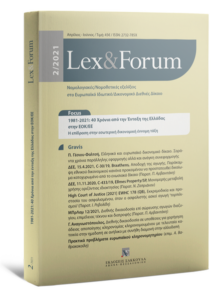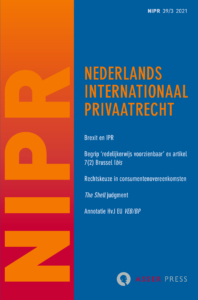Abu Dhabi introduces personal status law for non-Muslim foreigners, shakes up domestic and international family law
Written by Lena-Maria Möller,
Max Planck Institute for Comparative and International Private Law
Visiting Scholar, New York University Abu Dhabi
On 7 November 2021, Abu Dhabi, the largest of seven emirates that form the United Arab Emirates, announced the passing of a new personal status law for non-Muslim foreigners. The law carries forward a series of recent legal reforms that aim at providing greater legal certainty for the country’s large expatriate population. The law’s novelty lies in the fact that it combines aspects of substantive and international family law. It is significant also because it introduces civil marriage – albeit only for non-Muslim foreigners – into the country’s domestic family law regime. While generally welcomed as possibly easing judicial procedure and court proceedings, the new legislation also raises several questions, especially as regards the law’s application alongside the Emirati conflict-of-laws rules.
Multinationalism and its challenges for family law
Since the country’s foundation exactly 50 years ago, the United Arab Emirates have been characterized by large-scale labor migration of both low- and high-skilled workers and, as a result, by its highly diverse, multinational population. In a country of around 10 million inhabitants, only a little over one million are national citizens. This demographic makeup has been a challenge for both national and international family law as around 70% of cases filed with the domestic family courts have an international element. Prior to recent legal reforms, foreigners would either settle their personal status matters in their home country, or they would approach the local personal status courts where, in theory, they could choose between having the Islamically inspired Federal Personal Status Codes of 2005 or the laws of their home country applied. In legal practice, however, most personal status cases were settled according to domestic law. Among the main reasons was reluctance on the part of some family court judges to apply a set of rules they were not familiar with as well as the parties’ concerns that the application of their own national law would lead to their case being more costly and time-consuming. This was because Emirati courts have demonstrated a strong tendency to consider the foreign law as a fact which will have to be proven by the parties.
While domestic and international family law have traditionally been a matter of federal legislation, a few years ago, the emirate of Abu Dhabi already launched a first local initiative to offer alternative jurisdiction to its (non-Muslim) expatriate community. In late summer 2017, the emirate announced that it would allow Christian expatriates to divorce through their church. Instead of filing a divorce petition with the domestic family courts, foreigners residing in Abu Dhabi henceforth had the option of seeking mediation in their own place of worship. The proposal envisioned that once the couple, through such church-run mediation, had reached a divorce agreement settling questions regarding assets and the custody of children, these documents only needed to be authorized by the national courts to become enforceable. Initially, the amendment had been agreed upon only between the emirate of Abu Dhabi and local Christian leaders, but the inclusion of Hindu and Sikh religious communities was equally envisioned. The initiative to introduce church-run mediation and dispute resolution for Christian expatriates, however, proved impractical. For example, it remained unclear what legal status such religious out-of-court agreements would have in the home countries of foreigners residing in the United Arab Emirates. This was the case especially for all those expatriates whose home countries had abolished religious family adjudication or required a court’s substantive involvement in the dissolution of a marriage. The proposed alternative jurisdiction thus failed to meet the needs of many non-Muslim expatriates and instead another legislative amendment was introduced at the federal level in 2020.
In September 2020, a federal decree-law amended the country’s international family law by introducing recourse to the lex loci celebrationis. Instead of applying the law of a husband’s nationality, as was the case before, on the federal level, questions of marriage and divorce are now governed by the law of the country in which the marriage was concluded. While, at first glance, this conflict-of-law rule signaled a departure from nationality as the main connecting factor, the amendment was in fact framed in terms of expatriates being given the option of having “their own” laws, and those to which they have a stronger connection, applied. The new decree-law therefore also reiterated that nationality would determine the law applicable to a deceased person’s estate. The principle aim of the amendment was to offer expatriates access to a legal regime that they felt closely connected with and that met their regulatory demands best.
New national legislation for international cases
With Abu Dhabi’s new personal status law for non-Muslim foreigners, the transition from religious affiliation to foreign nationality as the main connecting factor (and thereby identity marker in the eyes of the legislator) has been partially reversed. Admittedly, the law, which contains a mere twenty articles (as opposed to the 357 articles-long Federal Personal Status Code), offers an accessible and easy-to-understand basis for adjudicating the most common personal status cases, including concluding and dissolving a marriage before the soon-to-be-established bilingual (Arabic and English) family courts for non-Muslim foreigners. As proclaimed in Article 2, the law is based on international best practices and aims to provide foreigners with a law that they find familiar in terms of “culture”, “customs”, and language. The same article also highlights that among the principle aims of the law is to safeguard the best interests of the child particularly upon divorce of the parents. Article 3 allows foreigners to opt out of the new law and instead request the application of the law of their home country. It must be assumed that in such cases it still falls upon the parties to present the detailed content of the foreign law and provide the court with its official translation.
Eleven articles of the new law are dedicated to substantive questions of personal status and stipulate, inter alia, that spouses to a civil marriage must at least be eighteen years of age (which corresponds to the rules in the Federal Personal Status Code) and must both explicitly declare their consent to marriage (i.e., the woman must not be represented by a marriage guardian as the country’s Islamically inspired family law envisions instead) (Article 4). Both spouses have access to unilateral, judicial divorce without having to demonstrate reasons for divorce, and the court will not establish a party responsible for the breakdown of the marriage (Article 6-7). The law envisions post-divorce maintenance only for the wife and does not contain any provisions entitling the divorced husband to alimony (Article 8). This rule stands in contrast to a general provision in the new law, Article 16, which reiterates the equality of men and women in the application of the law. The default post-divorce custody arrangement is joint custody with the competent court having discretion to decide to the contrary (Article 9-10). Filiation of a child is established either through marriage or acknowledgment (Article 14). Finally, the new law also covers questions of testate and intestate succession, provides for the deposition of a foreigner’s will in a special register (Article 13), and defines proportional rights for inheritance in case a non-Muslim foreigner dies intestate. In this case, the default rule is that the estate is divided in half between the deceased’s spouse and their children (without any distinction between sons and daughters) or the deceased’s parents and siblings (Article 11).
As already noted, the law is rather straightforward and lays down the most basic rules for different matters of personal status. Any questions not covered in the law will be regulated according to local and federal laws and legislation (Article 18), presumably including the Federal Personal Status Code, and the law states that additional executive regulations will be passed to regulate the application of the law in detail (Article 19).
Open questions
A substantive family law that is only applicable to foreigners is by any means a novel approach in family law internationally. Had the new law been aimed at governing matters of personal status for all non-Muslims (foreigners and national citizens) in the country, it would be consistent with the firmly established approach in the region of dividing the applicable family and inheritance law along religious lines. In its current form, however, the law conflates religious affiliation and citizenship as connecting factors in international and domestic family law. This poses a problem for all Muslim foreigners in the United Arab Emirates, especially those hailing from countries without religiously inspired family law. Should they not wish to be subject to the country’s Federal Personal Status Code, they must still demand the application of the laws of their home country and will have to go through the time-consuming and costly process of proving the content of these laws to the competent court. Their fellow countrymen and -women are spared such efforts owing merely to their different religious affiliation.
One may also wonder about the chances of judgments based on the new law being recognized in the parties’ home countries. It will be difficult for foreign courts to comprehend why the Emirati conflict-of-laws rules lead to the application of foreign law when instead the same case has been decided by a domestic set of rules designed specifically for foreigners. To add clarity, it would be useful to reference the new personal status law in the relevant rules on international family law. In addition, the wording of Article 3, which allows for foreigners to demand “the application of the law of their home country”, should ideally refer to the applicable conflict-of-laws rules in the country’s Civil Code – as does the corresponding rule in the Federal Personal Status Code. Otherwise, in some personal status matters, divorce for example, a total of three applicable laws are now competing with one another: the new domestic law for non-Muslim foreigners, the law of their home country, and the lex loci celebrationis that was introduced through the abovementioned conflict-of-laws reform of 2020.
Note: The Personal Status Law for Non-Muslim Foreigners in the Emirate of Abu Dhabi has not yet been published in the local gazette. The analysis above is based on a first unofficial version of the law that was obtained in advance.



 The third issue of the
The third issue of the 
